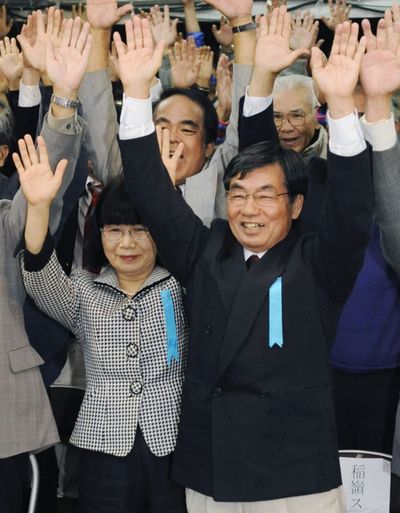Japan may nix Marine base
Okinawa vote puts pressure on deal

TOKYO – Japan’s prime minister said today he may overturn a key military deal with Washington on relocating U.S. troops, after a local election in Okinawa showed that residents oppose any new Marine base in their region.
Residents of Nago elected a mayor who is staunchly against moving a base there from a larger city nearby – plans which Washington considers fundamental to its troop realignment in the region. An agreement on the relocation was made under the previous government that lost power last year.
Prime Minister Yukio Hatoyama said the results of Sunday’s election reflected the will of the people, and that Japan would completely re-examine its accord with the U.S.
“The country will start from scratch on this issue and take responsibility to reach a conclusion by the end of May,” he told reporters.
His government has repeatedly put off making a decision, risking a rift with the U.S., its main military ally, in the face of security concerns like North Korea’s nuclear program and China’s rising strength.
Nago chose challenger Susumu Inamine – who campaigned against any expansion of U.S. military presence in the area – over incumbent Yoshikazu Shimabukuro.
The city’s mayor has little say in national policy, but with Japanese parliamentary elections coming in the summer, the results quickly reverberated throughout the country.
“It wasn’t just Shimabukuro that was defeated in the election. The biggest loser was Japan’s postwar military base strategy,” the national Asahi daily said in a front-page editorial.
Japan signed a deal with the U.S. four years ago that was part of a broader realignment of American troops, after a helicopter crashed into a university near Futenma in Okinawa. The Futenma facility, home to about 2,000 Marines, is one of the corps’ largest facilities in the Pacific.
A key part of the plan was relocating that base to the smaller city of Nago, where the latest election was held. The issue sparked intense protests and dominated debate between the two mayoral candidates. Shimabukuro supported the base for the jobs and investment it would bring.
Under a security pact signed in 1960, U.S. armed forces are allowed broad use of Japanese land and facilities. In return, the U.S. is obliged to respond to attacks on Japan and protect the country under its nuclear umbrella.